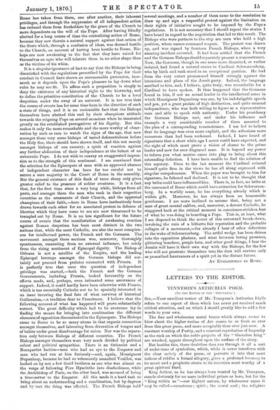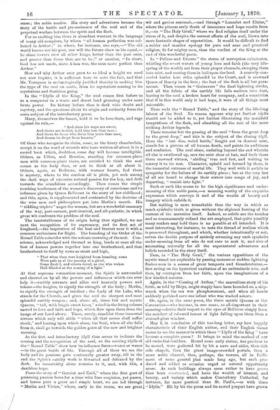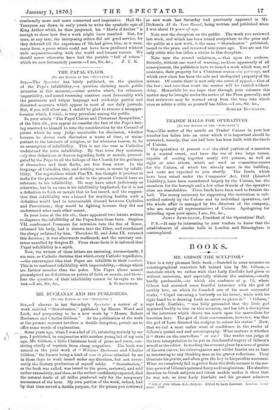LETTERS TO THE EDITOR.
TENNYSON'S ARTHURIAN POEM.
[TO THE EDITOR OF THE "SPECTATOR.']
SIR,—Your excellent review of Mr. Tennyson's Arthurian Idylls refers to one aspect of them which has never yet received much critical attention, and on which I should greatly like to add a few words to your own.
The fine and wholesome moral breeze which always seems to blow about the higher realms of Art comes to us fresh as ever from this great poem, and more acceptably than ever just now. A constant worship of Purity, and a constant reprobation of Impurity as the rock on which the noble projects of the "blameless king" are wrecked, appear throughout upon the surface of the story.
But besides this, there doubtless does run through it all a sort of under-tone of symbolism, which, while it never interferes with the clear melody of the poem, or perverts it into that most tedious of riddles a formal allegory, gives a profound harmony to its music and a prophetic strain to its intention most worthy of a great spiritual Bard.
King Arthur, as he has always been treated by Mr. Tennyson, stands obviously for no mere individual prince or hero, but for the "King within us "—our highest nature, by whatsoever name it may be called—conscience ; spirit ; the moral soul ; the religioui sense ; the noble resolve. His story and adventures become the story of the battle and pre-eminence of the soul and of the perpetual warfare between the spirit and the flesh. For so exalting him there is abundant warrant in the language of many old compilers, by whom "all human perfection was col- lected in Arthur ;" as where, for instance, one says,—" The old world knows not his peer, nor will the future show us his equal,— he alone towers over all other kings, better than the past ones, and greater than those that are to be ;" or another, "In short, God has not made, since Adam was, the man more perfect than Arthur."
How and why Arthur ever grew to so ideal a height we need not now inquire, it is sufficient here to note the fact, and that Mr. Tennyson is archasalogically justified thereby in making him the type of the soul on earth, from its mysterious coming to its mysterious and deathless going.
In the "Idylls of the King," the soul comes first before us as a conqueror in a waste and desert land groaning under mere brute power. Its history before then is dark with doubt and mystery, and the questions about its origin and authority form the main subject of the introductory poem.
Many, themselves the basest, hold it to be base-born, and rage against its rule,—
"And since his ways are sweet, And theirs are bestial, hold him less than man ; And there be those who deem him more than man, And dream he dropt from heaven."
Of those who recognize its claim, some, as the hoary chamberlain, accept it on the word of wizards who have written all about it in a sacred book which, doubtless, some day will become intelligible. Others, as Ulfius, and Brastias, standing for common-place men with common-place views, are satisfied to think the soul comes as the body does, or not to think at all about it.
Others, again, as Bedivere, with warmer hearth, feel there is mystery, where to the careless all is plain, yet seek among the dark ways of excessive natural passion for the key, and drift towards the scandalous accordingly. Then comes the simple touching tenderness of the woman's discovery of conscience and its influence given by Queen Bellicent in the story of her childhood ; and this, again, is supplemented and contrasted by the doctrine of the wise men and philosophers put into Merlin's mouth. His "riddling triplets" auger the woman, but are a wonderful summary of the way, part-earnest, part-ironical, and all-pathetic, in which great wit confronts the problem of the soul.
The inscrutableness of its origin being thus signified, we see next the recognition of its supremacy, and its first act of kinghood,—the inspiration of the best and bravest near it with a common enthusiasm for Right. The founding of the Order of the Round Table coincides with the solemn crowning of the soul. Con- science, acknowledged and throned as king, binds at once all the best of human powers together into one brotherhood, and that brotherhood to itself by vows so strait and high,
'That when they rose knighted from kneeling, some Were pale as at the passing of a ghost, Some flush'd, and others dazed, as one who wakes Half blinded at the coming of a light."
At that supreme coronation-moment, the Spirit is surrounded and cheered on by all the powers and influences which can ever help it—earthly servants and allies and heavenly powers and tokens—the knights, to signify the strength of the body ; Merlin, to signify the strength of intellect ; the Lady of the Lake, who stands for the Church, and gives the soul its sharpest and most splendid earthly weapon ; and, above all, three fair and mystic Queens, "tall, with bright sweet faces," robed in the living colours sacred to love and faith and hope, which flow upon them from the image of our Lord above. These, surely, stand for those immortal virtues which only will abide "when all that seems shall suffer shock," and leaning upon which aloue, the Soul, when all else falls from it, shall go towards the golden gates of the new and brighter morning.
As the first and introductory idyll thus seems to indicate the coming and the recognition of the soul, so the ensuing idylls of the" Round Table" show how its influence fares—waxes or wanes —in the great battle of life. Through all of these we see the body and its passions gain continually greater sway, till in the end the Spirit's earthly work is thwarted and defeated by the flesh. Its immortality alone remains to it, and, with this, a deathless hope.
From the story of " Geraint and Enid," where the first gust of poisoning passion bows for a time with base suspicion, yet passes, and leaves pure a great and simple heart, we are led through "Merlin and Vivieu," where, early in the storm, we see great wit and genius succumb,—and through "Lancelot and Elaine," where the piteous early death of innocence and hope results from it,—to "The Holy Grail," where we find religion itself under the stress of it, and despite the earnest efforts of the soul, blown into mere fantastic shapes of superstition. it would be difficult to find
a nobler and manlier .apology for pure and sane and practical religion, fit for mighty men, than the verdict of the King at the end of this wonderful poem.
In " Pelleas and Ettarre" the storm of corruption culminates, whirling the sweet waters of young love and faith (the very life- spring of the world) out from their proper channels, sweeping them into mist, and casting them in hail upon the land. A scarcely-con- cealed harlot here rides splendid to the Court, and is crowned Queen of Beauty in the lists ; the lust of the flesh is all but para- mount. Then comes in " Guinevere " the final lightning stroke, and all the fabric of the earthly life falls smitten into dust, leaving to the soul a broken heart for company, and a conviction that if in this world only it had hope, it were of all things most miserable.
Thus ends the "Round Table," and the story of the life-long labour of the Soul. No reason appears why yet further idylls should not be added to it, yet further illustrating the manifold temptations of the flesh, and absorbing all the rest of the more striking Arthur legends.
There remains but the passing of the soul "from the great deep to the great deep," and this is the subject of the closing idyll.
Here the "last dim, weird battle," fought out in densest mist, stands for a picture of all human death, and paints its awfulness and confusion. The soul alone, enduring beyond the end wherein all else is swallowed up, sees the mist clear at last, and finds those three crowned virtues, ' abiding ' true and fast, and waiting to convey it to its rest. Character, upheld and formed by these, is the immortal outcome of mortal life. They wail with it awhile in sympathy for the failure of its earthly plans ; but at the very last of all are heard to change their sorrow into songs of joy, and departing, "vanish into light."
Such or such like seems to be the high significance and under- meaning of this noble poem,—a meaning worthy of the exquisite expression which conveys it and of the wealth of beauty and imagery which enfolds it.
But nothing is more remarkable than the way in which so much syMbolic truth is given without the slightest forcing of the current of the narrative itself. Indeed, so subtle are the touches and so consummately refined the art employed, that quite possibly many readers may hold there is no parable at all intended. It is most interesting, for instance, to note the thread of realism which is preserved throughout, and which, whether intentionally or not, serves the double purpose of entirely screening any such symbolic under-meaning from all who do not care to seek it, and also of accounting naturally for all the supernatural adventures and beliefs recorded in the story itself.
Thus, in "The Holy Grail," the various apparitions of the mystic vessel are explicable by passing meteors or sudden lightning flashes seen in a season of great tempests and thunderstorms,— first acting on the hysterical exaltation of an enthusiastic nun, and then, by contagion from her faith, upon the imaginations of a few kindred natures.
Again, in the "Coming of Arthur," the marvellous story of his birth, as told by Bleys, might simply have been founded on a ship- wreck when the sea was phosphorescent, and when all bands suddenly perished save one infant who was washed ashore.
Or, again, in the same poem, the three mystic Queens at the Coronation—who become, in one sense, so all-important in their meaning—derive their import in the eyes of Bellicent simply from the accident of coloured beams of light falling upon them from a stained-glass window.
May I, in conclusion of this too-long letter, say how happily characteristic of their English author, and their English theme seems to me the manner in which these "Idylls of the King" have become a complete poem ? It brings to mind the method of our old cathedral-builders. Round some early shrine, too precious to be moved, were gathered bit by bit a nave and aisles, then rich side chapels, then the great image-crowded portals, then a more noble chancel, then, perhaps, the towers, all in fulfil- ment of some general plan made long ago, but each pro-
duced and added as occasion urged or natural opportunity arose. As such buildings always seem rather to have grown than been constructed, and have the wealth of interest, and beauty, and variety which maim Canterbury Cathedral, for instance, far more poetical than St. Paul's,—so with these "Idylls." Bit by bit the poem and its sacred purport have grown
continually more and more connected and impressive. Had Mr. Tennyson sat down in early youth to write the symbolic epic of King Arthur which, he then projected, his " Morte d'Arthur " is enough to show how fine a work might have resulted. But, for once, at any rate, the interposing critics did art good service, for they deferred till the experience of life had given him, as it were, many lives, a poem which could not have been produced without wide acquaintanceship with the world and human nature. We should never otherwise have had the parable "full of voices" which we now fortunately possess.—! am, Sir, &c., J. T. K.












































 Previous page
Previous page